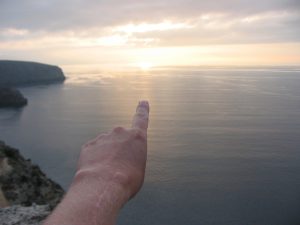 Navtej Johar, an amazing dancer, poet, Yoga teacher, once reflected on the inherent conflict between experience and expression – a conflict that is worthy of contemplation during times of global crises like 2020 and 2021.
Navtej Johar, an amazing dancer, poet, Yoga teacher, once reflected on the inherent conflict between experience and expression – a conflict that is worthy of contemplation during times of global crises like 2020 and 2021.
What you experience is completely personal. It is a sensory/mind interaction that only you ‘witness.’ However, once you attempt to express what this experience was, the completely personal must come into contact with the history of language, which is inherently external – defined by and given to us by others.
A restlessness arises when there is a disconnect between our experience and how that experience is expressed. Spending time in this gap between experience and expression drives one to action. It requires us to reinvent vocabulary or find other ways to embody this restlessness. (paraphrased from my notes on Navtej’s 2020 workshop Taming the Sensory Body).
However, we feel anchored to the words that are externally identified with our experience because they are how we have always connected our inner experiences with the external world – for example, “when I meditate, I experience God.” Words like ‘meditate’, ‘God’ have been defined for us, but what is it that we are trying to express with this two words? All words are bound to history, culture, etc. These words are worth examining because by turning to them, our expression of an experience has the capacity to alter the memory of the experience itself.
As we move through challenging times, like the Corona virus pandemic and the significant ramifications of it, one may be aware of this kind of ‘restlessness’….. have you noticed it in your life in the past months? (this being written in February 2021). Are you finding that certain expressions just to not capture this experience? I have found that simple questions like “How are you doing?” have become loaded with so much subtext that it feels almost impossible to answer in casual conversation.
Moving towards the Unknown?
I sometimes reflect on the mythologies of spiritual traditions in times of perceived restlessness – Not in search of answers but in search of examples of how others have moved towards the powerful, sacred space of deep not-knowing.
 I am reminded of a story of Francis of Assisi, a small Italian town full of spiritual practitioners. It was the origin of the Franciscan revolution over 800 years ago. It is a place I return to frequently with my teacher and collaborator Mirka Kraftsow for retreat and reflection. One of the rolls I serve on our retreats is as storyteller, bringing the myths of Francis alive as we embed ourselves in the historical locations. I have studied and sat with the details of the life of Francis of Assisi for several years.
I am reminded of a story of Francis of Assisi, a small Italian town full of spiritual practitioners. It was the origin of the Franciscan revolution over 800 years ago. It is a place I return to frequently with my teacher and collaborator Mirka Kraftsow for retreat and reflection. One of the rolls I serve on our retreats is as storyteller, bringing the myths of Francis alive as we embed ourselves in the historical locations. I have studied and sat with the details of the life of Francis of Assisi for several years.
As a young man who was the son of a wealthy merchant, Francis intended to serve as a knight in the crusades because that was what ‘success’ looked like for his gender and station at the time. He failed, miserably at this goal. Captured, tortured, and ill, he returned home, , and he was deeply restless.
In this state of mind, he went to a small chapel called San Damiano outside of the city walls. The little chapel was in disrepair but quiet and isolated. In this state of restlessness, he had an experience. The expression of that experience became a prayer in that tradition that marks the starting point of spiritual awakening:
Most High glorious God,
Cast Your Light into the Darkness of my Heart.
Give me, Lord,
Right Faith,
Firm Hope,
Perfect Charity,
and Profound Humility
With Wisdom and Perception
So that I may carry out
What is truly Your Holy Will.
One version of the mythology of St. Francis was that, in response to this prayer, the crucifix above the alter ‘spoke’ to him and said, “rebuild my church”. (there are other interpretations of this time in his life).
Whatever experience he had, this prayer may have been the beginning of his search for the expression of it. And what followed from this time was the story of his Dharma, of his life’s work. Sitting with this restlessness drove the action of his life. He asked for guidance – “cast Your Light into the Darkness of my Heart” – but he did not receive a definitive answer, rather a call to action. What he misunderstood to be guidance to rebuild a small, decrepit chapel, was a fire lit to shape the Church (the organization as opposed to a structure) into something more accurately expressing his experience of the teachings of Christ.
The rest of the life of Francis was a constant conflict of struggling to express the experience of his own experience of deep faith that ultimately started a revolution of the Church that became more similar to the way that Francis experienced faith himself.
Only Don’t-Know
 Francis of Assisi is far from the only person to find refuge in the conflict of not knowing what is deeply experienced – the deep wordlessness of experience. It is the Heart of Zen teachings and touched upon in all spiritual traditions. In fact, those who become sources of spiritual inspiration often do so because they actively seek refuge in this restless space of unknowability.
Francis of Assisi is far from the only person to find refuge in the conflict of not knowing what is deeply experienced – the deep wordlessness of experience. It is the Heart of Zen teachings and touched upon in all spiritual traditions. In fact, those who become sources of spiritual inspiration often do so because they actively seek refuge in this restless space of unknowability.
As we move through powerful times like the current pandemic, the deep connection with profound uncertainty puts us all in the realm of the saints. This ‘don’t-know’ space is a sacred one, it is a natural state in the undefined reality in which we live. Can we find Peace in that? Can we find Refuge in that?
I find that Rainer Maria Rilke expressed the joy of this state beautifully (my English translation/interpretation from original German):
Be patient with all that lies unsettled in your own heart and
try to love the Questions themselves,
Like a mysterious mountain cabin, locked up tight, and
like books written in an unknownable language.
For the moment, do not seek the answers,
which you cannot be given because
you would not be able to live them.
Remember, the point is, to live EVERYTHING.
Live the questions now.
Perhaps you will, gradually,
without even noticing it,
live along some distant day
into the answer.
